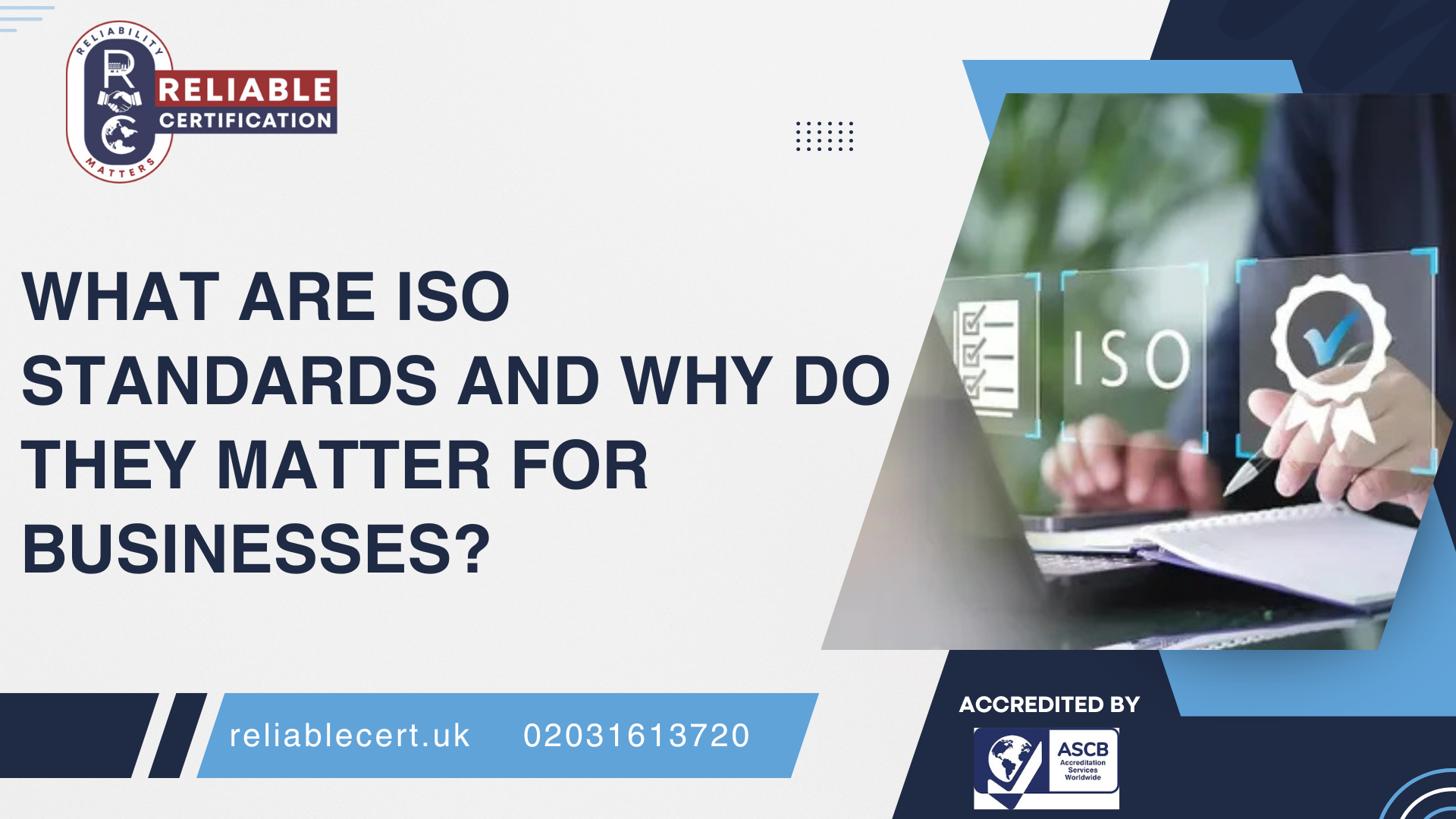Learn what ISO standards are and how they benefit businesses. Discover their impact on quality, efficiency, trust, and global success in this easy-to-read guide.

In today’s competitive and globalised market, businesses are constantly seeking ways to improve quality, build trust, reduce risks, and comply with international regulations. One proven way to achieve all of this is by adopting ISO standards.
But what exactly are ISO standards? And why should your business care about them?
Let’s break it down in simple terms and explore how these global standards can help your business grow and succeed.
ISO standards are internationally recognised guidelines, frameworks, or requirements developed by the International Organization for Standardization (ISO). These standards are designed to ensure consistency, safety, quality, and efficiency across industries, products, services, and systems.
In short, ISO standards act as a universal language that businesses around the world can follow to improve performance, meet regulations, and deliver customer satisfaction.
The International Organization for Standardization, headquartered in Geneva, Switzerland, develops these standards. It’s a non-governmental, global network of national standards bodies from over 160 countries.
Each ISO standard is created by technical experts, industry professionals, and stakeholder groups who collaborate to develop best practices that work across different regions and sectors.
Whether you're a small startup or a large corporation, implementing ISO standards can bring several advantages. Here’s why they’re important for your business:
ISO standards help businesses deliver products and services that consistently meet customer and regulatory expectations. For example, ISO 9001 focuses on quality management and process control, leading to fewer errors and higher customer satisfaction.
Achieving ISO certification demonstrates that your business follows recognised best practices. It builds trust among customers, investors, and partners, especially in industries where safety, security, or compliance is critical.
Many international contracts require ISO certification. Being certified allows your business to compete in global markets and meet international trade requirements.
ISO standards promote streamlined processes, risk management, and continual improvement. This reduces waste, saves time, and boosts productivity.
ISO standards are often aligned with national and international regulations. By following them, businesses can ensure compliance and reduce the risk of legal issues.
Here are some of the most widely adopted ISO standards and what they focus on:
|
ISO Standard |
Focus Area |
Description |
|
Quality Management |
Helps businesses maintain consistent quality in products and services. |
|
|
Environmental Management |
Guides companies in reducing environmental impact and improving sustainability. |
|
|
Information Security |
Protects sensitive business and customer data from breaches and cyber threats. |
|
|
Occupational Health & Safety |
Ensures safe and healthy working conditions for employees. |
|
|
Food Safety Management |
Manages food safety risks in the food supply chain. |
|
|
Energy Management |
Optimises energy use and promotes sustainability. |
Let’s take a closer look at how ISO standards translate into real business benefits.
By improving quality, safety, and service delivery, ISO standards increase customer trust and loyalty.
Many ISO standards include risk-based thinking. This helps businesses identify, assess, and control risks in advance.
Certification can give your business a competitive edge when bidding for contracts or attracting new customers.
Standards like ISO 9001 encourage businesses to continually evaluate and improve processes, products, and performance.
No, certification is not mandatory. Businesses can implement ISO standards informally and still benefit from the structure they provide.
However, many organisations choose to get certified by an independent certification body to prove compliance and gain a competitive edge. Certification acts as a stamp of approval that your company meets international standards.
ISO standards are not limited to manufacturing or large corporations. They’re used across many sectors, including:
Whatever your industry, there’s likely an ISO standard that applies to you.
Here’s a simplified step-by-step guide to help your business begin its ISO journey:
Research and choose the ISO standard(s) that apply to your industry and business goals.
Compare your current practices to the requirements of the standard.
Create an action plan to align your processes with the ISO standard, including policies, training, and documentation.
Train your team and apply new procedures in daily operations.
Check your processes before inviting external auditors.
Hire a certified body to assess your compliance. If successful, you’ll receive an ISO certification valid for a set period (usually 3 years).
Absolutely. ISO standards can help small and medium enterprises (SMEs) streamline operations, build customer trust, and grow sustainably.
Adopting standards early in your business journey can provide a strong foundation and help avoid costly mistakes later.
ISO reviews its standards roughly every 5 years to keep them relevant. Businesses should stay informed about updates to maintain compliance and take advantage of improvements.
For example, ISO 9001 was updated in 2015 to place more emphasis on risk management and leadership involvement.
Let’s clear up some common myths:
ISO standards are more than just checklists or certificates. They’re powerful tools that help businesses improve quality, increase trust, reduce risks, and stay competitive in the market.
Whether you're aiming to expand globally, win more contracts, improve customer satisfaction, or simply operate more efficiently, adopting ISO standards can support your long-term business success.
Start small, choose the right standard, and make it part of your company’s culture.
At Reliable Certification, we help businesses understand, implement, and get certified for various ISO standards. Whether you're new to the concept or ready to get certified, our expert team is here to guide you. Get in touch with our team now
Typically replies within 30 minutes